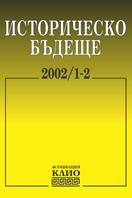Националната идентичност на босненско-херцеговинските мюсюлмани във ФНРЮ (1946–1961)
The National Identity of Bosnian and Hercegovinian Moslems in the Federal People’s Republic of Yugoslavia (1946–1961)
Author(s): Vanya IvanovaSubject(s): History
Published by: Асоциация Клио
Keywords: Muslims; Bosnia and Hercegovina; National identity; National question; Yugoslavia
Summary/Abstract: In the present study an attempt is made to present more fully the problem of the national identity of the Mohammedan population of Bosnia and Hercegovina in the period between 1946 and 1961. In the chronological period referred to the attempts continued to enlist that population for the Serb and the Croat national causes on the basis of the South Slav ethnic origin and the Serbo-Croatian language spoken by it, as the people at the head of the Yugoslav Federation looked upon the islamicized inhabitants of the People’s Republic of Bosnia and Hercegovina as a separate religious community without transferring the differentiation in the confessional aspect to the national one. The author produces varied evidence by means of which the impossibility of speaking about a separate, Moslem nationality in the 1940s and 1950s is substantiated. This evidence is presented in the form of several provisionally differentiated levels. First, the constitutional level is treated, as the Constitution of the Yugoslav Federation and those of the particular Yugoslav Republics should take the highest possible place in the hierarchy of legal values. Next, the author sets apart the various interpretations of the relations among the separate nations which can be found in documents from important leadership forums, in the speeches and works of prominent Yugoslav state and party leaders, in the works of political scientists and historians, and in the data from the censuses of 1953 and 1961. It turns out that the Moslems in Bosnia and Hercegovina, who had the opportunity of declaring themselves Serbs or Croats, for the most part preferred to remain nationally undefined. Confessional affiliation was at the root of their strong desire for national distinction. Religion shaped the entire outlook upon life of the islamicized inhabitants of Bosnia and Hercegovina and ranked among the main reasons for the refusal on the part of the Serbs and the Croats to accept the Moslems as equal in rights, that is to say as an integral part of their nations. After 1961 the Moslems in Bosnia and Hercegovina got the status of a separate people, enjoying the same rights as the other five Yugoslav nations, something that could not have happened in the 1940s and 1950s because of the lack of appropriate conditions from the point of view of both foreign and internal policy.
Journal: Историческо бъдеще
- Issue Year: 2002
- Issue No: 1-2
- Page Range: 37-60
- Page Count: 24
- Language: Bulgarian
- Content File-PDF

